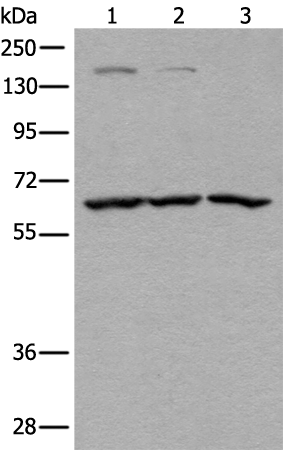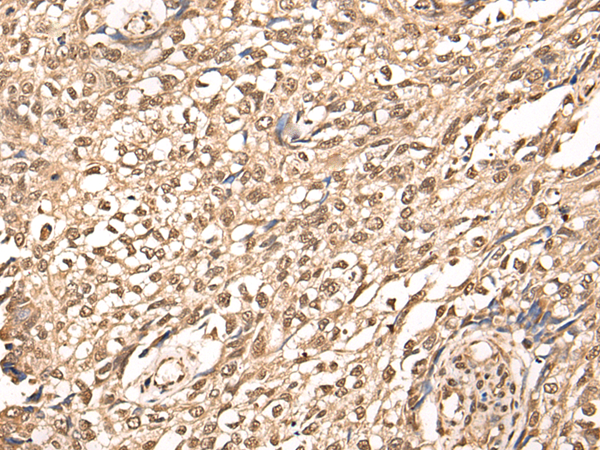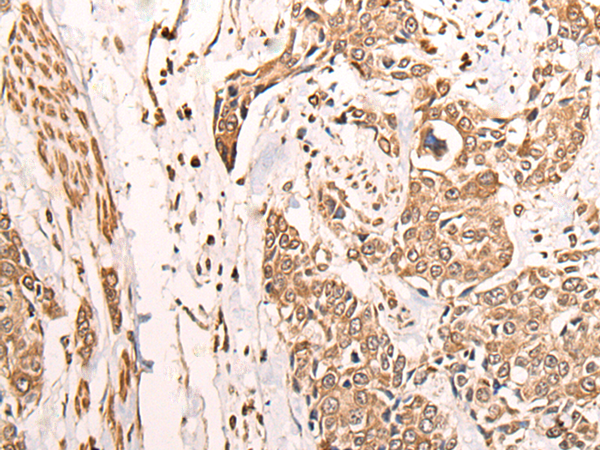


| WB | 咨询技术 | Human,Mouse,Rat |
| IF | 咨询技术 | Human,Mouse,Rat |
| IHC | 1/25-1/100 | Human,Mouse,Rat |
| ICC | 技术咨询 | Human,Mouse,Rat |
| FCM | 咨询技术 | Human,Mouse,Rat |
| Elisa | 1/5000-1/10000 | Human,Mouse,Rat |
| WB Predicted band size | 71 kDa |
| Host/Isotype | Rabbit IgG |
| Antibody Type | Primary antibody |
| Storage | Store at 4°C short term. Aliquot and store at -20°C long term. Avoid freeze/thaw cycles. |
| Species Reactivity | Human, Mouse, Rat |
| Immunogen | Fusion protein of human ATAD3A |
| Formulation | Purified antibody in PBS with 0.05% sodium azide and 50% glycerol. |
+ +
以下是关于ATAD3A抗体的3-4篇参考文献及其摘要概括:
1. **文献名称**:*ATAD3A promotes neuroblastoma tumorigenesis by regulating mitochondrial biogenesis*
**作者**:Amin HK, et al.
**摘要**:该研究通过Western blot和免疫荧光技术,利用ATAD3A抗体证实其在神经母细胞瘤中高表达,并调控线粒体生物合成,促进肿瘤细胞增殖和存活。
2. **文献名称**:*ATAD3A mutations alter mitochondrial DNA maintenance and cholesterol metabolism*
**作者**:Li JL, et al.
**摘要**:研究通过免疫沉淀和免疫印迹分析,发现ATAD3A基因突变导致线粒体DNA不稳定及胆固醇代谢异常,依赖ATAD3A抗体揭示其功能缺失的表型。
3. **文献名称**:*ATAD3A interacts with the ER membrane to regulate mitochondrial cholesterol transport*
**作者**:He J, et al.
**摘要**:使用ATAD3A抗体进行共聚焦显微镜观察,发现ATAD3A在内质网-线粒体接触点介导胆固醇转运,影响线粒体膜结构完整性。
4. **文献名称**:*Oncogenic role of ATAD3A in hepatocellular carcinoma through mitochondrial dysfunction*
**作者**:Chen X, et al.
**摘要**:通过免疫组化分析(使用ATAD3A抗体),证实ATAD3A在肝癌组织中过表达,与线粒体功能障碍相关,且高表达患者预后较差。
以上文献均涉及ATAD3A抗体在机制研究中的应用,涵盖肿瘤、代谢疾病等领域。
**Background of ATAD3A Antibody**
ATAD3A (ATPase family AAA domain-containing protein 3A) is a mitochondrial membrane-anchored protein critical for maintaining mitochondrial structure, function, and communication with the endoplasmic reticulum. It belongs to the AAA+ ATPase family, characterized by conserved ATP-binding and hydrolysis domains. ATAD3A plays roles in mitochondrial DNA (mtDNA) organization, cholesterol metabolism, and regulation of apoptosis and autophagy. Dysregulation of ATAD3A is linked to neurodegenerative disorders, cardiomyopathies, and cancers, with overexpression observed in tumors like glioblastoma and hepatocellular carcinoma.
ATAD3A antibodies are essential tools for studying its expression, localization, and interactions. They are widely used in techniques such as Western blot (WB), immunofluorescence (IF), and immunohistochemistry (IHC) to investigate ATAD3A’s role in mitochondrial dynamics and disease mechanisms. Recent studies highlight its involvement in mitochondrial protein synthesis and its interaction with proteins like SAMM50 and PHB2. Notably, ATAD3A mutations are associated with severe neurodevelopmental disorders, underscoring its importance in cellular health. Antibodies targeting specific epitopes (e.g., N-terminal or C-terminal regions) help dissect its multifunctional domains and post-translational modifications, aiding both basic research and clinical diagnostics.
×